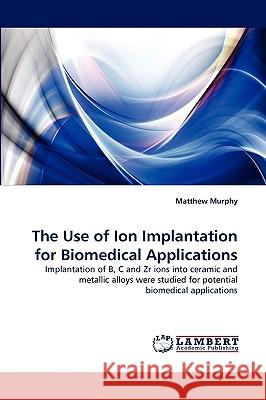The Use of Ion Implantation for Biomedical Applications » książka
The Use of Ion Implantation for Biomedical Applications
ISBN-13: 9783838378954 / Angielski / Miękka / 2010 / 348 str.
The implantation of boron, carbon and zirconium ions into alumina, zirconia, zirconia-toughened-alumina, Orthinox stainless steel and a Co-Cr-Mo alloy were studied for potential biomedical applications. The ion dose for the three selected ion species was varied to investigate the mechanical behaviour and microstructural development of the various ceramic and metallic materials as a function of ion species and dose. The mechanical and chemical properties studied involved hardness, indentation fracture toughness, wettability and friction testing both before and after the implantation of each material. The microstructural effects of ion implantation were examined using Scanning Electron Microscopy and Transmission Electron Microscopy. Computer simulations of the ion concentration beneath the implanted surface were carried out using the 'Transport and Range of Ions in Matter' code to aid in the understanding of the microstructures formed after high dose implantation.
The implantation of boron, carbon and zirconium ions into alumina, zirconia, zirconia-toughened-alumina, Orthinox stainless steel and a Co-Cr-Mo alloy were studied for potential biomedical applications. The ion dose for the three selected ion species was varied to investigate the mechanical behaviour and microstructural development of the various ceramic and metallic materials as a function of ion species and dose. The mechanical and chemical properties studied involved hardness, indentation fracture toughness, wettability and friction testing both before and after the implantation of each material. The microstructural effects of ion implantation were examined using Scanning Electron Microscopy and Transmission Electron Microscopy. Computer simulations of the ion concentration beneath the implanted surface were carried out using the Transport and Range of Ions in Matter code to aid in the understanding of the microstructures formed after high dose implantation.











